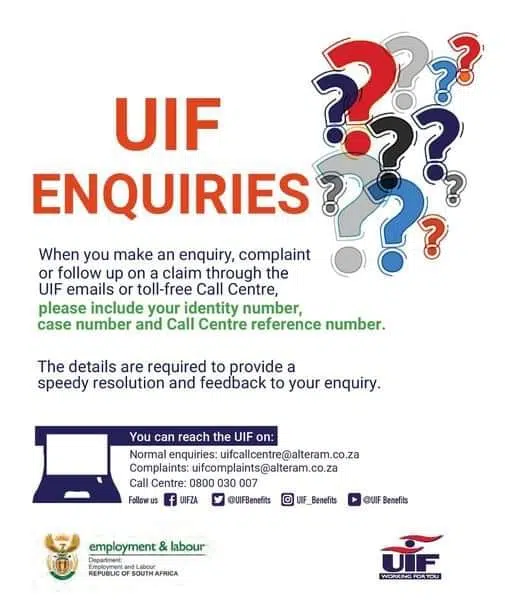The Unemployment Insurance Fund (UIF) is a crucial financial safety net for South Africans who are temporarily or permanently unable to work. The fund provides financial relief in situations such as job loss, maternity leave, illness, and death of a contributor. However, for many people, navigating UIF Enquiries and the claims process can be confusing and frustrating.
With the right information, your UIF Enquiries can be processed efficiently.
Key Details for UIF Enquiries
When making an enquiry or following up on a claim, it’s essential to include the following details for quick processing:
- Your identity number
- Your case number (if you are following up on an existing claim)
- Call Centre reference number (this is particularly important for tracking the progress of previous calls or communications)
Including these details ensures that the UIF agents can easily locate your file and provide the necessary feedback and resolution to your enquiry.
UIF Contact Details
For any UIF-related enquiry, complaint, or follow-up, you can reach the UIF through the following channels:
- Normal Enquiries:
Email: uifcallcentre@alteram.co.za - Complaints:
Email: uifcomplaints@alteram.co.za - Call Centre:
Toll-free number: 0800 030 007
These contact details are provided by the UIF for quick and easy communication. Whether you’re making a general enquiry, lodging a complaint, or tracking the progress of a claim, the email addresses and the toll-free number are your primary means of contact.
Good News: UIF Extended Operating Hours in September 2024
Tips for a Smooth UIF Enquiry Process
To ensure that your enquiry is handled swiftly and efficiently, follow these tips:
- Have your documents ready: Before contacting the UIF, ensure you have all relevant documentation, such as your ID number, case number, and reference number, on hand. This will prevent delays.
- Be specific in your enquiry: When sending an email or speaking to a UIF agent, be clear about what you are enquiring about—whether it’s about the status of your claim, submitting additional documents, or requesting general information.
- Follow up: If you haven’t received feedback within a reasonable time frame (usually 7–10 working days), follow up using the reference number provided by the Call Centre. This helps avoid the frustration of waiting without knowing the status of your enquiry.
- Use the correct communication channel: Ensure that you are sending your enquiries to the correct email addresses provided by the UIF. This will ensure that your issue is directed to the right department.
Common Reasons for UIF Enquiries
Many individuals reach out to the UIF for a variety of reasons. Here are some common scenarios where you may need to contact the UIF:
- UIF Claim Submission: You’ve submitted your claim but haven’t heard back after a while, or you’re unsure if the documents you provided were correct.
- Claim Rejection: Your claim has been rejected, and you want to understand why or provide additional documents to support your application.
- Delayed Payments: You’ve been approved for UIF benefits, but the payment hasn’t arrived within the expected period.
- Updating Details: If you need to update your personal details (e.g., banking information or contact number), it’s important to inform the UIF promptly to avoid delays in your payments.
- General Information: Sometimes you may just need more information about how the UIF works or how to claim under certain conditions such as maternity leave, illness, or the death of a contributor.
What to Expect When Contacting UIF
When you contact the UIF, the typical process involves:
- Initial Contact: You’ll send an email or make a phone call with the necessary details (ID number, case number, reference number).
- Acknowledgment: The UIF may send you an acknowledgment of your enquiry, particularly if you reach out via email. In some cases, they may ask for more details if required.
- Processing: Your enquiry will be directed to the relevant department, and UIF agents will work on your request or complaint.
- Feedback: Depending on the nature of your enquiry, the UIF will provide feedback—whether it’s about the status of your claim, necessary documentation, or the resolution of a complaint.
Troubleshooting Common UIF Issues
Unfortunately, many UIF claimants experience delays or challenges when dealing with the UIF system. Below are some common problems and solutions:
- No Response from UIF: If you’ve waited for more than 10 working days without a response, it’s recommended to follow up with a phone call. Ensure you have the reference number from your initial enquiry for easy tracking.
- Missing Documents: One of the most common reasons for claim delays is missing documents. Always double-check that you’ve submitted all the required paperwork. If you’re unsure, contact the UIF Call Centre to confirm.
- Payment Delays: If your claim has been approved but you’ve not yet received payment, reach out to the UIF Call Centre or complaints email to check if there are any issues with your bank details or processing delays.
Read More: Does UIF Expire? Understanding the Unemployment Safety Net
Frequently Asked Questions (FAQ)
Q: How long does it take to get a response after making UIF enquiries?
A: The UIF usually takes 7 to 10 working days to respond to most enquiries. If you don’t receive feedback within this period, it’s a good idea to follow up by emailing or calling the UIF with your reference number.
Q: What should I do if I don’t receive a response to my UIF enquiry?
A: If you don’t receive a response after 10 working days, follow up with another email or call. Make sure to provide your reference number from your previous UIF enquiry to help the UIF agents locate your records faster. If you’re still having issues, you can escalate your complaint by contacting the complaints email: uifcomplaints@alteram.co.za.
Q: Can I check the status of my UIF claim through UIF enquiries?
A: Yes, you can check the status of your UIF claim by making UIF enquiries via email or phone. Ensure that you provide your ID number, case number, and any reference number related to previous communications with the UIF.
Q: What do I do if my UIF claim is rejected?
A: If your UIF claim is rejected, you can submit a UIF enquiry to find out why your claim was denied. Often, rejections occur due to missing documents or incorrect details. Once you know the reason for rejection, you can provide the necessary documents or correct the information and reapply.
Dealing with UIF enquiries, complaints, or claims can be a stressful experience, especially when faced with delays or unclear communication. However, by following the tips provided in this guide and ensuring you include all necessary information when reaching out to the UIF, you can make the process much smoother.
If you ever find yourself needing assistance with UIF, remember the contact details shared above and always keep a record of your communications. This way, you can follow up effectively and ensure that your claim is processed in a timely manner.










